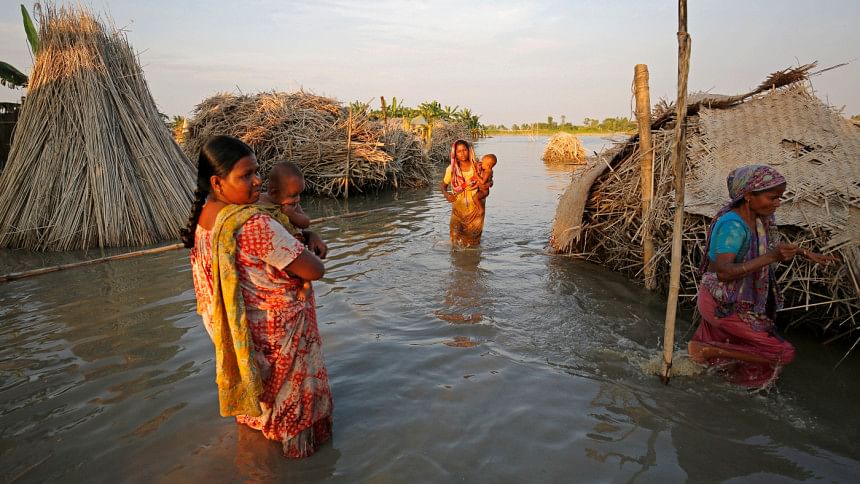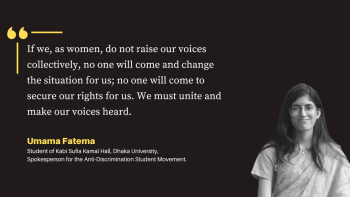How the weight of systemic issues weigh women down

In the heart of Dhaka, amid the chaos and vibrancy of life, a young girl named Bashonti navigates her challenging existence. Born in a village that once thrived along a riverbank, her family's life was uprooted by the relentless force of river erosion. At a tender age, Bashonti, along with her mother, father and brother, migrated to the slums of Dhaka, trading a world filled with greenery and open fields for narrow alleyways and city concrete. This new reality starkly contrasted with her idyllic memories, and instead of offering opportunities, the city suffocated her with its struggles.
Each year, an estimated 700,000 Bangladeshis are displaced by climate-induced disasters. River erosion alone displaces 100,000 people annually. The International Organization for Migration (IOM) reports that up to 70 percent of slum dwellers moved to Dhaka after experiencing environmental hardships, such as river erosion, cyclones, and flooding.
Bashonti often longed for the river and the lush landscapes of her village, feeling out of place in her crowded surroundings. The harsh conditions of water scarcity and lack of sanitation only heightened her discomfort. In Dhaka's slums, 50-65 percent of residents who report receiving water services from Dhaka WASA access this water source directly from their own dwelling, yard or plot. And only 27.9 percent of slum households used improved non-shared toilet facilities while 41.9 percent used improved but shared toilets.
With her family preoccupied with survival, Bashonti frequently found herself alone, tasked with adult responsibilities from a young age. She was coerced into doing chores and left to fend for herself against the grim realities of her environment, including harassment from neighbourhood men—an experience she learnt to accept as part of life. A report by Bangladesh University of Health Sciences (BUHS) revealed that 88 percent of children experienced physical abuse or sexual harassment at least once, with 55 percent enduring this repeatedly.
At just five years old, Bashonti was thrust into a world where she was responsible for helping her mother cook and fetch water. Endless tasks on the grindstone for spices left her hands sore and blistered, prompting tears of frustration. Despite her desire to play freely, the narrow alleys were filled with adult reprimands, cutting short her childhood. A 2021 study shows that women in Dhaka division spend 4.48 hours in unpaid domestic services for household and family members and 1.36 hours in unpaid caregiving services for household and family members, where men did the same for 0.54 hours and 0.27 hours, respectively.
Amid these difficulties, hope emerged when Bashonti was admitted to a nearby school, a brief escape from her harsh life. However, the classroom lacked adequate infrastructure. In Bangladesh, primary school enrolment has reached 98 percent, while slum households have a primary school enrolment rate of only 77.2 percent, with girls facing higher barriers to completing education. Yet, against all odds, Bashonti completed her primary education and surprised her family, only to face societal pressures, including the prospect of an early marriage.
Eventually, she returned to her village to live with her grandparents while grappling with financial constraints. Menstruation was an added challenge for her. Nearly 40 percent of girls miss school due to menstruation as a result of inadequate facilities and supplies. Determined to succeed, Bashonti continued her education and ultimately married a farmer, albeit one with less education than her.
Unfortunately, her new life was burdened by domestic responsibilities, farming, and the relentless impacts of climate change on their livelihoods, exacerbating financial strains. Climate change leads to a decline in productivity and increase in rice in the domestic markets. Simulation with a 25 percent reduction in arable land and 15 percent reduction in productivity also found that rice land and non-rice agricultural land are also decreasing day by day.
Climate crisis is linked to rising domestic violence in South Asia as well. Over 55 percent of married women in Bangladesh face physical or sexual harassment in their lifetime, and 80.2 percent of currently married women experience at least one form of partner violence including physical, sexual, economic, and controlling behaviour. Bashonti again became the victim of societal failings, suffering in silence until the strains of her life drove her to a breaking point.
The decision to move back to Dhaka with her mother-in-law marked a new chapter filled with hope. As Bashonti adjusted to the bustling metropolis, she secured a job in a workshop, only to discover wage inequalities between male and female workers. One such study found that rural women earn 45 percent less wages than men and urban women earn 31 percent less than men.
The gender wage gap persists across industries. However, with resolve, she pursued training and became a garment factory supervisor, carving out a space for herself in a vital sector for the economy. The garment industry contributes approximately 83 percent of Bangladesh's export earnings, employing over 40 lakh workers, of whom nearly 54 percent are women. In a regular working month (excluding overtime), the average salary was Tk 9,984 (Tk 9,669 for women and Tk 10,928 for men). However, the statutory minimum wage was only increased to Tk 12,500 (106 euros). This figure is far below the subsistence level. Workers often contend with delayed wages, and are often forced into high-interest debt to survive, all while women frequently navigate unwanted advances to secure loans.
Bashonti felt the weight of systemic issues. In RMG factories, sexual violence or harassment in the workplace is widespread; In Bangladesh, 80 percent of female garment workers have either experienced or observed such behaviour in the workplace. Reflecting on Bangladesh's historical context, she recognised the pivotal role women have played in the nation's journey, yet questioned whether they have truly progressed at the same pace as men.
With the arrival of her child, the issues of feeding and caring became paramount. Stunting in slums is 60 percent higher than in non-slum areas, while children in slums are 74 percent more likely to be underweight compared to children in non-slum areas. Besides, without adequate childcare facilities, the burden of motherhood only compounded her existing challenges.
Until the contributions and needs of women like Bashonti are acknowledged and supported, the façade of progress will remain fragile. Bangladesh can increase its economic output by nearly 40 percent by closing the gender gap and increasing women's participation in the economy, according to the International Monetary Fund (IMF).
Ultimately, Bashonti's story embodies the resilience and strength of countless women trapped within the complexities of poverty, exploitation, and systemic neglect. The juxtaposition of glistening skyscrapers against the backdrop of impoverished slums serves as a haunting reminder of the social disparities that persist in Bangladesh. Her journey speaks to the urgent need for societal transformation.
Kazi Amdadul Hoque is a climate, development, and humanitarian activist. His X handle is @KaziAmdadbd. He can also be reached at [email protected].
Views expressed in this article are the author's own.
Follow The Daily Star Opinion on Facebook for the latest opinions, commentaries and analyses by experts and professionals. To contribute your article or letter to The Daily Star Opinion, see our guidelines for submission.

 For all latest news, follow The Daily Star's Google News channel.
For all latest news, follow The Daily Star's Google News channel. 










Comments